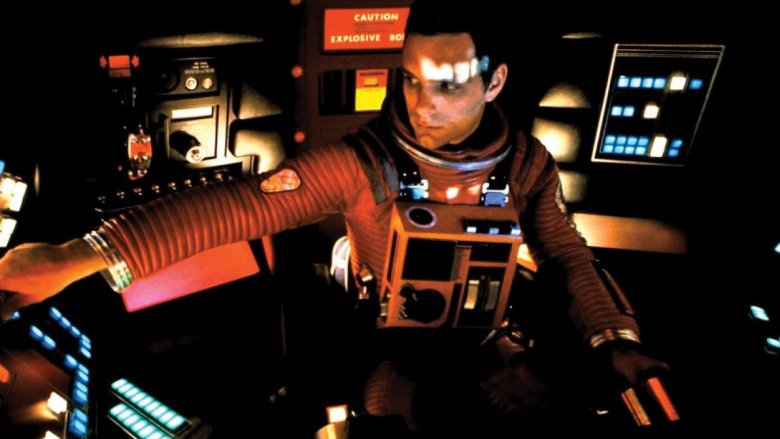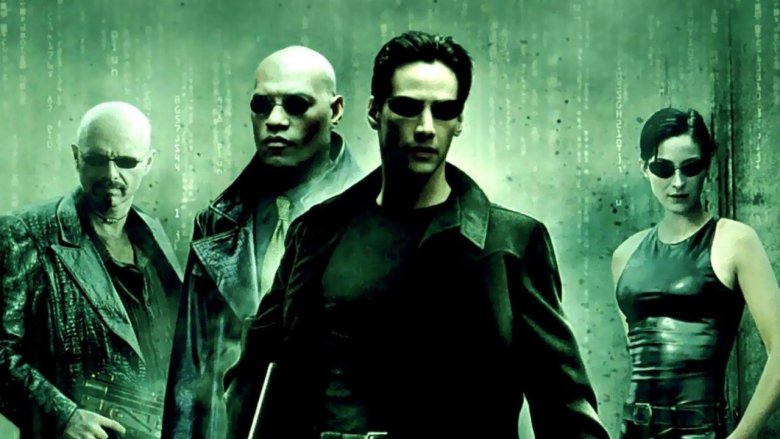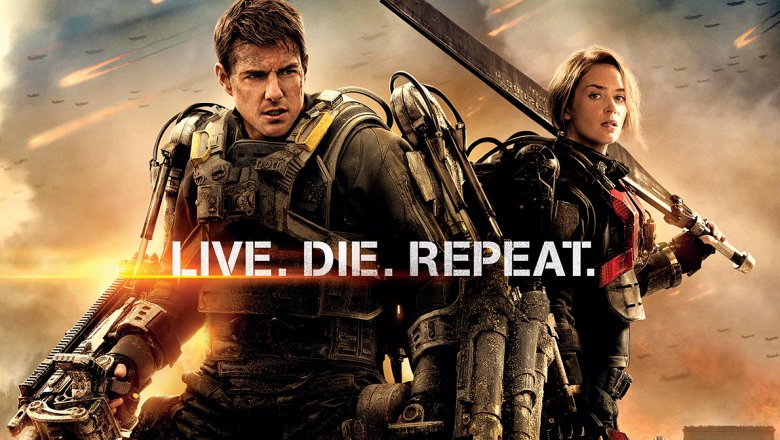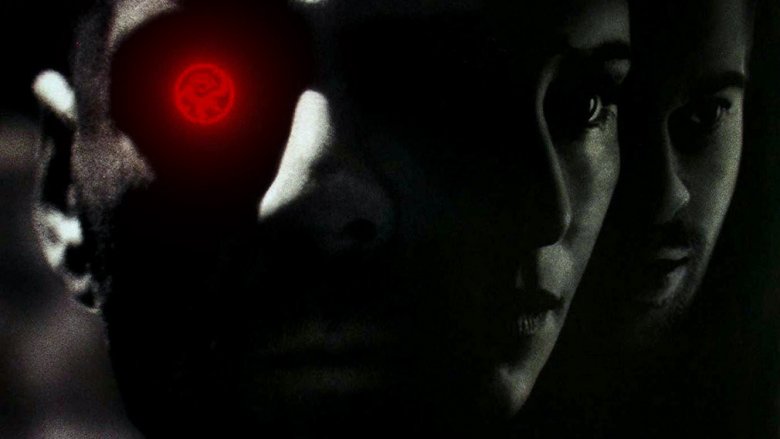Complex Movies That Would Work Better As Video Games
Some of us want straight-up escapism from movies, while others enjoy complex brainteasers. And while there's nothing wrong with nudging your noggin from time to time, let's be honest: some movies are too damn weird and complex for their own good and are just as likely to leave you and your friends arguing as they are to leave you happy. However, some of these complex movies could have been perfect ... if they had never been movies at all. In fact, some of these ideas would be downright revolutionary if they were turned into video games instead.
2001: A Space Odyssey
When it comes to science fiction movies, 2001: A Space Odyssey is one of the very best. It brings up heady ideas about humanity, evolution, and artificial intelligence that we still debate to this day. At the same time, though, the movie has far-out visuals that put Doctor Strange to shame, and this is on top of a slow pace that's compounded by many of the scenes having little or no dialogue. In fact, this movie topped a prominent list of the most confusing movies of all time. However, there are seeds in this confusing movie that would make an absolutely awesome video game.
In spirit, a 2001: A Space Odyssey game would likely play out like a much more serious version of the hit game Portal. The malevolent robot HAL 9000 would play the role of a GLaDOS-like character who is simultaneously interested in humanity as well as protecting himself from humans at all cost. The events of the movie lend themselves pretty naturally to puzzles for a player to solve, and these may range from repairing equipment to rescuing fellow crewmen who have been targeted by HAL. Ultimately, such a game could still deliver poignant messages about the nature of humanity, but it would be done in a tight game driven by dialogue and several sets of urgent-but-innovative puzzles.
Donnie Darko
Donnie Darko is a film of mesmerizing beauty that covers a rather impenetrable plot. What might seem like a standard coming-of-age story soon transforms into a tale of jet parts falling from the sky, strange sleepwalking, and surreal visions of Frank the Bunny. It all caps with an ending that undoes all of the events of the movie as Donnie, now back in the past, allows himself to die from a jet engine falling on him. While that bizarre ending set off a fierce debate about the meaning of the movie, it serves as one of the reasons this movie would make for a surprisingly versatile video game.
The world of Donnie Darko lends itself well to a Telltale Games-style adventure game. This would really flesh out these strange characters and settings through interactions and multiple playthroughs (which would be much more satisfying than simply watching the movie multiple times to figure out what the hell is going on). There would be an opportunity here to really explore Donnie's mind, his dreams, and uncover their exact connection to reality (something the movie failed to do). One exciting mechanic the game could have would be jumping back and forth through time, changing certain things in one time period to affect events in another. The full possibilities of this feature were previously explored in Titanfall 2, and such a feature would be completely at home in a game about a character obsessed with time travel.
The Matrix
The Matrix has already had a game. In fact, it's had several: there was the awkward Max Payne rip-off Enter the Matrix, followed by the less awkward Max Payne rip-off The Path of Neo. In the middle was The Matrix Online, which mashed the gun-fu of the other games into the classes and hot keys of a standard MMORPG, leading to decidedly mixed results. But a better video game could provide us with a fresher glimpse of the world established by the first movie.
Ultimately, the Matrix series was a victim of its own success. The sequels suffered from a variety of problems. However, the Animatrix movie (really a collection of small animated films) let us see how fun this world could be by changing everything up. One tale in this collection showed how robots first rose up against humanity, while another shows how an old-school, noir-style detective gets caught up in a world of Agents and rebels. A video game could finally explore something other than just the gunplay and bullet time of these movies.
For instance, three-dimensional platforming (à la Mirror's Edge) would showcase the true fun of bending the rules of physics, while a survival horror–style game could explore what it's like in the early days of robots taking over the world. There's even room for an unconventional multiplayer online battle arena game with multiple roles for players. For instance, different players could handle roles fighting in the Matrix, hacking the Matrix, and defending the real-world ship from squid-bots, all while other players controlling agents and squid-bots try to eliminate humanity. In short, this would be the opportunity for the world of the Matrix to finally show us it knows more than kung-fu and guns.
Cube
The Cube's original concept already sounds a lot like a video game. Characters wake up inside a room and quickly discover that the room is rigged with a trap to kill them. Once they figure out the trap and get to the next room, they realize they're in an elaborate maze inside a giant cube: each room is virtually identical, but there are a great deal of different and very lethal traps. The assorted characters must use their varied strengths to determine both how to survive and ultimately escape from this insanely specialized prison. The movie is long on style but short on answers: audiences never find out exactly who made the cube or what awaits the final survivor.
Why would this make a better video game than movie? One reason is it has the potential to be a grim and bloody cooperative adventure: just as in the movie, players could have unique strengths, and a simple randomizing algorithm could ensure no two cube experiences are exactly alike, forcing players to communicate and think on their feet to survive. To enhance the paranoia, different players should be given different secret goals to achieve during play, with the possibility that one player is instructed to betray the others. The mechanic (made popular by tabletop games such as Dead of Winter) would force players to second-guess each other's advice, as there's always the chance that another player cannot win until he accidentally (or not so accidentally) gets the entire team killed.
The Butterfly Effect
Of all of the movies on this article that feature some element of time travel, The Butterfly Effect is one of the grimmest. Its plot revolved around a character realizing that his lifelong memory blackouts surrounding various traumas (including being forced into child pornography, seeing his dog burned to death, and accidentally killing a mom and her child with dynamite) are moments that he can travel back to as an adult. He attempts to improve the future, but manages to create progressively darker versions of the world for himself and his friends. It's an entertaining enough take on the concept of the butterfly effect itself, but the frequent time jumps, reality warps, and ambiguous ending all added up to audience confusion, and the performances led to some unintended audience laughter. However, its premise alone gives it the potential to be one of the greatest games ever made.
This should be an adventure game with an emphasis on finding and connecting clues. Ideally, the player would be given a simple-sounding goal (such as "don't kill that poor lady with dynamite") and then go back in time, but be forced into a series of interactions and actions before they can achieve it. Once they go back, though, the future should be dramatically changed (and potentially far worse) based on the conversations and actions that they took. At this point, the player should have a choice of whether to travel back to the same moment or to choose a different destination to fix their inevitable mistakes. Ultimately, this game would encourage casual replaying as players try to figure out what action or conversation selection led to a particular disastrous outcome. This game could have countless different endings, with none of them outwardly telegraphed as "good" or "bad"—they're simply the ultimate result of the choices players make, forcing players to confront the dangers of both playing god and tampering with time.
Edge of Tomorrow
Edge of Tomorrow was a truly engaging sci-fi movie. Tom Cruise's cowardly character is forced into war against alien invaders, and when some of their blood gets on him, he is forced to re-live his day over and over, starting over each time he dies in combat. He ends up getting better at the inevitable alien battle each time by memorizing exactly what's going to happen. While the movie proved to be very engaging, it seemed at all times very much like a video game brought to life. So how about it just play out as a video game then?
The goal of an Edge of Tomorrow video game would perfectly mirror the movie. It would play out like one huge level, and your character would be someone who dies very easily (no rechargeable shields or health you can replenish). There would be no continues. Rather, your character would start the battle over from the beginning whenever you die. However, the enemies and events would play out the exact same each time, so by memorizing (and dying) enough, you can achieve a perfect run through the game. While such a game would not be a hit with more casual gamers, it would be an enormous one hit with competitive types to see who can make it through without dying, make it through in the shortest time, and so on.
Prometheus
As a movie, Prometheus played out a lot like your high school crush: it was beautiful, bewildering, and perhaps more shallow than you initially thought. Audiences thought they were going to get a straightforward prequel to the first Alien movie from director Ridley Scott, but he delivered a head-scratching tale of space exploration, alien gods, and a mysterious black liquid that had a different effect on people every time we saw it. So, even as we cheer the escape of our two survivors from the hostile planet, we are left with questions about the role of the god-like aliens, what the ooze was, why it had such different effects, and so on. You can't help but feel that if you were let loose in that environment—an experience only video games really offer—you'd be able to uncover answers to all those questions.
A Prometheus video game would be best in the form of an open-world survival horror game. There would be an amazing planet for players to explore and discover (possibly with the option of randomly generating a new planet each time, like in Minecraft), but there's the constant overt threat of the alien Engineers (who will immediately try to kill you if you disturb their slumber) and the more covert threat of the black alien goo, which threatens to turn friends and allies into nightmare creatures. Throw in a literal AI partner in the form of android David, and you get one more layer of tension, as many parts of the game would be insanely difficult without his help, but he may choose to abandon or infect you in his quest to better understand the aliens on this hostile planet.
Interstellar
Interstellar impressively ramped its weirdness up more and more as its runtime (very nearly three hours) went by. At first, the film looked like it might be a mundane movie about space exploration, the likes of which we have seen countless times before. However, the movie gets strange when it starts exploring time-distortions caused by gravity. In one vivid instance, the characters lose over two decades from a simple trip to a planet's surface. Eventually, main character Coop travels directly into a singularity and finds himself in a world where he can transcend time and space, becoming a ghost in his daughter's past to send her the info she needs to save humanity.
Confused yet? The movie is even weirder, with its complexity wrapped up in issues of gravity, time, and time-travel. So maybe a video game wouldn't be the best medium to capture every plot twist and character moment, but it would make for an amazing way to experience the film's space exploration.
An Interstellar game should play out like a heavily modified version of No Man's Sky. Players would be encouraged to explore the different worlds out in space that may or may not have the info they need. However, the twist would come in the form of those same time-distorting gravity effects, so planetary visits may cost precious time back on the ship. Players would have to become very efficient at planetary exploration and puzzle solving to get the various resources they need (both for the planet Earth's researchers and to keep their ship afloat), but in space, they'd have to become adept at navigating wormholes, achieving optimal orbits, and occasionally slingshotting their ship around a black hole. It would be a dynamic and engaging experience every time you play, and unlike the movie, you wouldn't need a degree in theoretical physics to understand it.
12 Monkeys
12 Monkeys follows a character who comes from a future where humanity has been almost entirely wiped out by a virus, and he is sent back in time to gather enough information about it to help the scientists of his present time develop a cure. While that may sound straightforward, the movie explores heady concepts such as predestination paradoxes, fate, and a kind of apocalyptic inevitability that hangs over the entire plot. All of these combine in a way that's likely to leave audiences arguing once the credits roll, but this movie's plot is very fertile ground for a new and dynamic type of game.
This game would be a detective story with a time-travel twist. You play a character who must chase down various clues to achieve your goals, but all of this is made more difficult by the sometimes-inaccurate information from your post-apocalyptic future as well as your own memories of the past, which are sometimes unreliable. Ultimately, this would be the real innovative twist of this game: your history and memory are unreliable, and the constant threat of causing the very things you are trying to avoid means each game has the potential to play out very different from your other sessions.
The Island
The Island was an engaging movie that pretty much put the most popular dystopian novels into a blender to create a movie that, while new, often left sci-fi fans feeling like they had been there and done that. For non-sci-fi fans, the movie was often confusing: it dealt with hidden cloning facilities, sophisticated holograms, identity swapping, and enough plot twists to keep your head spinning throughout the entire film.
This movie's premise is tailor-made to be a classic Bioware RPG. There are mysteries about character and setting that you could try to unravel, and Bioware's conversation system would be a perfect way of allowing you to play as a different kind of clone each time. In fact, the revelation that you are a clone could be handled with your character suddenly piecing together various clues you have picked up throughout the game. Throw in the later plot element of having to impersonate the very person you are cloned from, and such a game has great potential, forcing you to play a role within a role even as you tackle crunchy questions about what, exactly, makes us human as well as what makes us unique.










